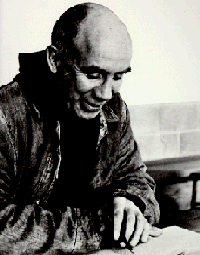
Remembering those who've served, and who paid the ultimate price. They are the true heroes.
<>< TM
transformation, contemplation, intercession and general silliness
While I was at the Combined Press Information Center in Baghdad on my recent trip to Iraq, a pair of Spanish journalists--a newspaper reporter and a photojournalist--walked in, fresh from their embed with the 1-4 Cavalry of the First Infantry Division (the unit with which I embedded only days later). They had spent two weeks amongst the troops there, living and going on missions with them, including house-to-house searches and seizures, and their impressions of these soldiers were extremely clear.
"Absolutely amazing," said David Beriain, the reporter (and the one who spoke English), said of the young Cavalry troops. "In Spain, it is embarrassing--our soldiers are ashamed to be in the army. These young men--and they seem so young!--are so proud of what they do, and do it so well, even though it is dangerous and they could very easily be killed." Mr. Beriain explained that the company he had been embedded with had lost three men in the span of six days while he was there--one to a sniper and two to improvised explosive devices, both of which had blown armored Humvees into the air and flipped them onto their roofs. Despite this, he said, and despite some of the things they might have said in the heat of the moment after seeing another comrade die, the soldiers' resolve and morale was unshaken in the long term, and they remained committed to carrying out their mission to the best of their ability for the duration of their tours in Iraq.
It was in the process of performing that mission, of coping with the loss of loved ones, and of just being themselves as American soldiers that these young men were able to win over the admiration and affection of more than one journalist who had arrived in their midst harboring a less-than-positive opinion of the Iraq war, and of those who were tasked with prosecuting it.
"I love those guys," Mr. Beriain said, looking wistfully out the window of the media cloister in the Green Zone that is the Combined Press Information Center. "From the first time you go kick a door with them, they accept you--you're one of them. I've even got a 'family photo' with them" to remember them by. "I really hated to leave."
Atheism can't accept a place in the spectrum alongside other ideas because it has to destroy religion. It has to be base itself upon the outmoded concept that one idea is true and its contrary is false. Now Christianity believe this too. As I say, it's both good and bad for Christianity. But Christianity can survive in a version that liberalizes itself enough to be part of the mix. It has its' special qualities that others don't have and that's its appeal but it can also allow others to have their views. Atheism can't allow any idea but one, hate religion. Atheism depends upon the myth of a golden progress into the shining Godless future where science has prevailed and destroyed religion, leaving it behind as a failed adaptation. That myth is over. That myth is the myth of modernism and has been left behind in the dust.
Of course fundamentalism will have to go. That may be on the rise now the new atheist fundamentalists are an attempt to join the ranks of the postmodern fundies, but it wont succeed because it's major myth is opposed to the paradigm of the world today. Atheism has to destroy religion, it has to dissolve it, it has to undermine it or it can't exist. The existence of atheism as anything other just a lack of belief, which is far from all it is, is predicated upon hatred of religion and the need to demonstrate one's superiority over religious people. This is not an age for that. This is the age of tolerance, diversity, of equality among all ideas. The Irish gave up their passion for a nationalistic Northern Ireland because they realized they would rather go shopping than blow things up. A liberalized Christianity can fit into the diversified mixture of a postmodern social construct, but atheism can't by its nature and its definition.

